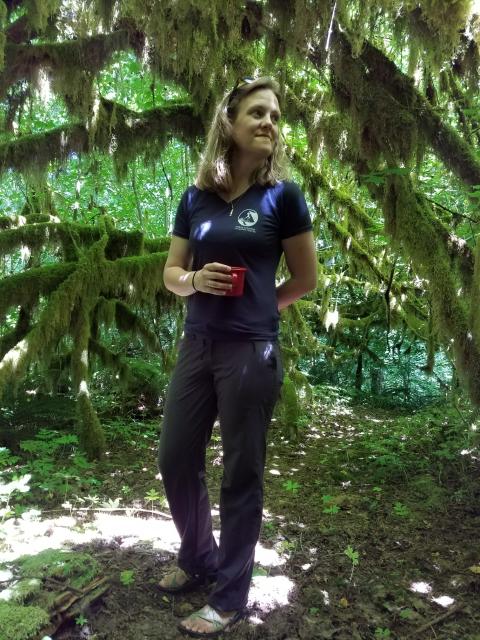
I graduated from Plymouth with a BA in English in 2016. I went on to earn my MA in Environmental Arts and Humanities from Oregon State University in 2019. I pursued English because I sensed my curiosity could not be restrained into one discipline, and I believed the study of “English”, i.e. the study of stories, i.e. the study of the full richness of our worlds and how we fit into them calls on wisdom from a broad spectrum of academic fields. Studying English prepares one not for a cookie-cutter, money-maker job, but for fully-engaged, meaningful, and rich life-work. As an English major at Plymouth, I cultivated a practice of seeing beyond face value, asking challenging and complicated questions, and daring to reach outside conventional methods to seek answers that is carrying me into the post-graduate world.
In my first semester, my Early British Literature professor Karolyn Kinane posed the question: what separates man and beast? Her question was most directly a rhetorical reflection on the relationship between Beowulf and Grendel, but, for me, the query stoked my curiosity about our relationship to nature and how we fit in it. This question rattled in my brain in every subsequent course and in my professional life at the Appalachian Mountain Club (AMC), and, ultimately, the question of what separates man and beast led me into my graduate studies.
Concurrently, I enrolled in “Hazardous Earth,” an Earth science course, with Mary Ann McGarry. We studied natural processes of the Earth, earthquakes, eruptions, landslides, etc., and their impact on ecosystems and human populations. This course shed new light on the notion that natural systems have agency in our lives and that, whether or not we are conscious of it, our cultures are impacted by our environments. Taking this class helped me to see the cross-pollination between theories of science, anthropology, and literature.
In “The Real World” with Robin DeRosa, I learned to question all that seemed given: language and its connection to that which it symbolizes, landmarks and the nature of commemoration, of memory, etc. “The Real World” dismantled the pillars upon which I supposed our world rested: Objectivity, Truth, Inherence. Without these tenets, the walls between siloed disciplines crumbled, and the world became so obviously textured, conditional, and endlessly multi-dimensional.
The summer before my graduation, I enrolled in Ann McClellan’s Digital Literature course in which I discovered the beauty/necessity/inevitability of the nonlinear story. The course exposed how layers of meaning, story, and perspective can overlap, redirect, rejoin, and deepen what presents as surface, and how a multiplicity of media can so enrich, engage, and enliven readership experience. I found it to be a wholly organic and ecological method of storytelling.
In my final semester at Plymouth, I took Liz Ahl’s Poetry Workshop. I imagined it might be a neat and focused period at the end of such a wild and philosophical tenure as an English major. I did not foresee that this course would illuminate my path forward. Some weeks into the semester, Liz sat down at her personal shelves of poetry and selected a poet for each of her students to read. She chose a poet who she believed might interest, align with, or possibly provoke that particular student and bolster their own poetic practice. For me she chose Charles Goodrich, an Oregon-based poet who writes about the natural world.
When I researched Charles Goodrich, I found that he was connected to the Spring Creek Project for Ideas, Nature, and the Written Word, an initiative that takes an interdisciplinary approach to tackle daunting environmental issues and re-imagine our relationship to the natural world. All of my fires were lit by the Spring Creek Project, and when I found that they were closely associated to an emerging graduate program, Environmental Arts and Humanities, at Oregon State University, I applied, was accepted, and relocated to our continent’s convergent coast.
The Environmental Arts and Humanities attracted students from the broad spectrum of academic and artistic disciplines. We were a cohort of writers, painters, philosophers, farmers, zoologists, marine biologists, opera singers, and we were charged with imagining futures beyond the wicked problems that plague us today. My time as an English Major at Plymouth prepared me well for the mind-altering practice of interdisciplinary work and hours spent sitting with uncomfortable and challenging questions.
In my graduate work, I used morality as a lens to focus on the human relationship with energy, culminating in a thesis, “Responsible Generation: How Care Ethics Can Activate a Just Energy Transition.” Professionally, I interned for the Spring Creek Project for two years, helping to dream up, organize, and execute interdisciplinary programing such as the “Bedrock Lectures on Human Rights and Climate Change,” the Permanent Peoples’ Tribunal on Human Rights, Fracking and Climate Change, and the “Chrysalis Symposium: Courageous Transformation for the Climate Crisis,” among many other author readings and interdisciplinary panels. Concurrently, I was a Writing Assistant for author and environmental ethicist Kathleen Dean Moore, helping with research, editing, and submission of articles and op-eds. I also served as her Research Associate for an upcoming book, Witness: The Human-Rights Impacts of Fracking and Climate Change. During my time as a graduate student, I was able to participate in the Blue River Writers Gathering at the H.J. Andrews Long-Term Ecological Research Site, and I was awarded a graduate student residency at the Shotpouch Cabin in the Coast Range of Oregon.
Since graduating in June 2019, I have returned to the White Mountains to split my time between work with the Appalachian Mountain Club and the small used books store I own with my mother. I dream of initiating programs in these hills that bring together environmental science, history, philosophy, and narrative to engage all manner of citizens in solving deeply-rooted environmental issues. This, I believe, is my life’s work.

